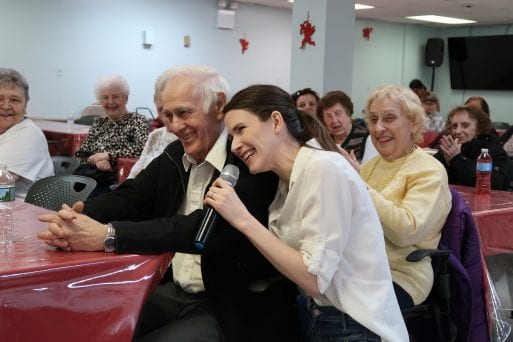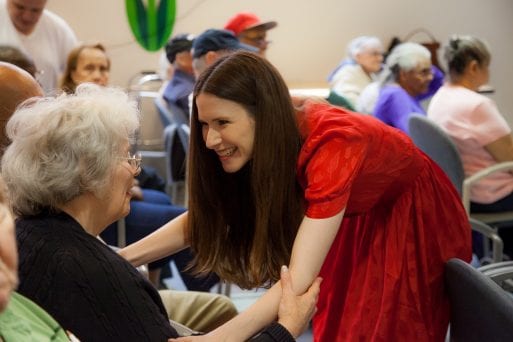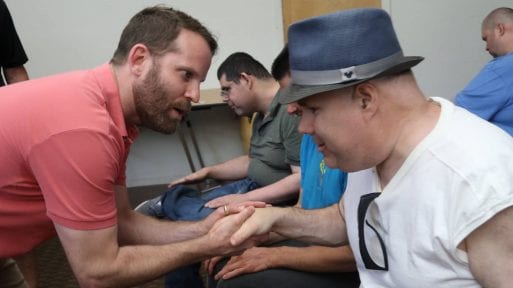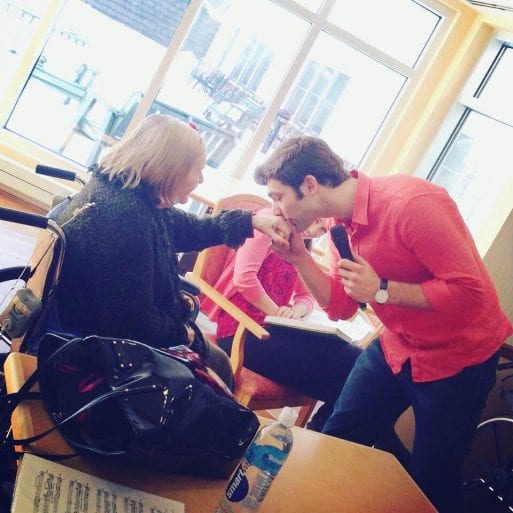
Jackie Vanderbeck has been building connections through music and storytelling since she was a child. The daughter of a dancer, her own creative expressions and musical performances were encouraged and nurtured during her youth in Sacramento, California. By the age of 8, Jackie was actively participating in the Fair Oaks Children’s Repertory Theater (which closed in 1997 with the retirement of its founder, Micky Wever); and by the age of 12, she was performing professionally with the Sacramento Theater Company and Broadway at Music Circus.
As with most aspiring performers, Jackie performed for her family — especially her Great-Grandma Dee Dee and her sister Jaime. It was during those intimate times that Jackie experienced, almost unconsciously, the authentic connections that musical storytelling could inspire.
After attending Natomas Charter School of the Performing Arts, Jackie went on to study Musical Theater at one of the top-performing art colleges in the country — the University of Cincinnati, College-Conservatory of Music (CCM).
Jackie graduated with honors, received the Ross Award for Excellence in Musical Theatre, and headed to New York City to pursue her career. It was there that her past experiences and her current environment came together and she started the non-profit organization, Sing For Your Seniors. This joyful organization brings music and musical theater to thousands of seniors and marginalized communities across New York City.
In the last 15 years, Sing For Your Seniors has grown to include more than 200 volunteers putting on an average of 80 performances each year with Sing For Your Seniors Sessions, Broadway Sessions, and Broadway for the Blind (held every year at the LightHouse for the Blind and Visually Impaired’s Enchanted Hills Camp, in Napa CA).
Colleen Ferguson: So, in 2005, it’s post-college and you’re in New York City pursuing your career in musical theater. How did Sing For Your Seniors come to be?
Jackie Vanderbeck: After about a year and a half of building my life in New York City, I started to feel a bit disconnected from the work I had been so passionate about. While I loved music and storytelling, it can be an isolating process to audition. And it just doesn’t feel as fulfilling as when you’re in a show or studying.
So I did some soul-searching, asking myself, “Why am I not happy?” I realized that being far away from my family was hard. Growing up, my grandparents lived next door, and I always had elders in my life and I was missing that component. I needed to find some elders in my new community to connect with, so I started looking.
I ended up calling a few places, and saying, “Hey, I’m just curious if I can come down and sing some songs.” The Village Adult Day Center in the West Village said come on down so one day, I went during their lunchtime. I mingled, talked with some folks, and then they said, “Okay Jackie is going to sing.” This sparked more conversations with me and with each other.

“Together we can change the way our culture responds to seniors in our society by opening our awareness to those who have been tucked away. Reach out, connect and include.”
– Jackie Vanderbeck
Colleen: Was it pretty instinctive what you were going to do?
Jackie: Yes, I was just doing what came naturally. When I was in college, friends would come home with me during breaks and they were forced to come to sing with me to visit Grandma Dee Dee, who lived in a group home. I credit those experiences with how I connected the dots for Sing For Your Seniors.
I would sing to Grandma in her room, and the other ladies in the rooms next to her would come around to listen and it would be community building within her home. And at the time, I didn’t know that’s what I was doing. Later, looking back on it, I could see these experiences were huge in shaping Sing For Your Seniors. Also growing up with my sister who was blind and developmentally delayed — we had music in our house all the time and I saw firsthand how it affected her. I was able to connect with my sister through music and theater in a way that challenged our differing realities.
“Oh, that’s not how you connect? Let’s try this instead…”
Colleen: What do you mean when you say “challenged reality?”
Jackie: When someone’s ability to communicate is compromised or if they’re non-verbal, due to dementia or developmental disabilities, you can find other ways to communicate. For example, at one of our centers, there was a woman named Nora who didn’t speak English, but she would meet my pitch while I sang. We didn’t talk about anything, but we were connecting. And that goes back to communicating with my sister — it’s about learning how to connect with people in the way that works for them, not just in the “easiest” way. More like, “Oh, that’s not how you connect? Let’s try this instead…”
And even though we all came from different backgrounds, singing just started a connection. No matter what, we were able to have a conversation about something, together. Sing For Seniors is about singing, but it’s also about listening.

“If you’re blind or visually impaired, there’s a large portion that you’re not experiencing and that can be discouraging. My sister loved musicals, and the music helped her to understand what the emotional arc of the story was, which otherwise wouldn’t have been easy to follow.”
– Jackie Vanderbeck, explaining why she started Broadway for the Blind
Colleen: It all began with you singing acapella for a few folks at the Village Adult Day Center; now, 15 years later, Sing For Your Seniors serves 14 different senior centers and has expanded its programs. Could you tell us more about those?
Jackie: For most centers, we’re there every month and for others every other month, which works out to about six to seven sessions a month at different locations all over NYC. We don’t just visit a facility and never come back again. We are not there to perform at people, we are there to create bonds and relationships. Each center has their own favorite songs, so we always let our volunteers know which places love jazz, which ones love Broadway or contemporary Broadway. Some of the centers we’ve been serving for nearly a decade, so you get to know what people like.

Gabrielle Elisabeth of The Black is Beautiful Project performing with Sing For Your Seniors Broadway Sessions at the Central Harlem Senior Citizens’ Center.
Then we have a program called Broadway Sessions which brings Broadway performers from a show to seniors who can’t attend theater due to physical or financial or developmental reasons. We like to focus our outreach to underserved communities that don’t have the resources to bring in programs. That’s where I want Sing For Your Seniors to be.
When we expanded Sing For Your Seniors to include the Piano Placement Project we wanted to make sure everyone had access to music. There were a lot of places we wanted to serve that didn’t have a piano or keyboard, which we needed for our sessions. So we started raising money to get pianos or keyboards to those centers. And it’s not just for our use — we want the music to stay in the center. We want it to be theirs. We want them to take ownership.
Colleen: How does it work with making sure you have enough performers for all these different sessions?
Jackie: We have 200 volunteer professional artists who rotate through our centers. And it works great for them and for us! Because an actor’s life is so changeable, many feel that they’re disqualified from participating in a lot of volunteer organizations. But since I too am a performing artist, I understand that, and we make it easy to account for those changes. An artist signs up for a session, and there’s no rehearsal. They can come, bring their book, and we know it’s going to be amazing because of their level of performance experience and professionalism. If they have to cancel, it’s no problem because we have “swings.” There’s always someone who can cover.
And in 15 years, we’ve never canceled a session on our account, which is pretty incredible. That speaks to how beloved this program is by our performer community.
Colleen: It makes sense that it’d be such an amazing experience for the seniors, but it must be a powerful experience for the volunteers as well.
Jackie: I can’t tell you how often our Broadway performers will say, “Thank you for reminding me of why I started doing this in the first place.” Because when you’re in a show, you’re on stage performing and you don’t necessarily know how your message is being received. But when you do perform at the senior center, you see right in front of you that you’re moving someone to tears or making them giggle with joy. It reminds us of how powerful it is to share this kind of work.

“I realized that I was not the one providing a service that morning. I was not the one offering the healing, but one of the many receiving it. That’s the power of music. And by that, I am both humbled and filled with gratitude.”
– Lukas Poost, Sing For Your Seniors Participant
It’s incredible to watch and beautiful to see the artist community respond. I love seeing a new person perform with us, it’s transformative for everyone. That’s why we call them sessions, not performances. We’re here to share stories and inspire conversation. It’s great to be reminded that we all need connection.
If we as an organization can build a bridge between people that need a connection, then let me at it! When I have talked to artists who are struggling in the hunt for jobs and meaning in their work, our more seasoned artists will joke about prescribing Sing For Seniors because it will change everything for them.
Colleen: This has been great to learn about. What does the future look like for Sing for Your Seniors?
Jackie: I have so many wants. I would love to one day have a Sing For Your Seniors program in every city. We’re going to be exploring more intimate settings. Right now our sessions are very much concert- or cabaret-style — a room with lots of people. We go out into the audience and sing with people directly, so we’d like to take that component and put it under a magnifying glass. How can we do this if the audience can’t leave their beds? We’re exploring different avenues to see how we can make it as accessible and inclusive as possible. And I hope this inspires people to be more inclusive with the senior community and see the value of connecting with them.
Colleen: I’ve loved learning more about your program and I’m sure our readers will, too. Thank you so much for taking the time to speak with us.

 Creating Powerful Connections with Music and Storytelling
Creating Powerful Connections with Music and Storytelling


 Our Annual Seven Holiday Gifts for Someone Who Is Grieving, 2024 Edition
Our Annual Seven Holiday Gifts for Someone Who Is Grieving, 2024 Edition
 “Making Mobiles” by Karolina Merska
“Making Mobiles” by Karolina Merska
 “Hands Up to the Sky” by Michael Franti & Spearhead
“Hands Up to the Sky” by Michael Franti & Spearhead














